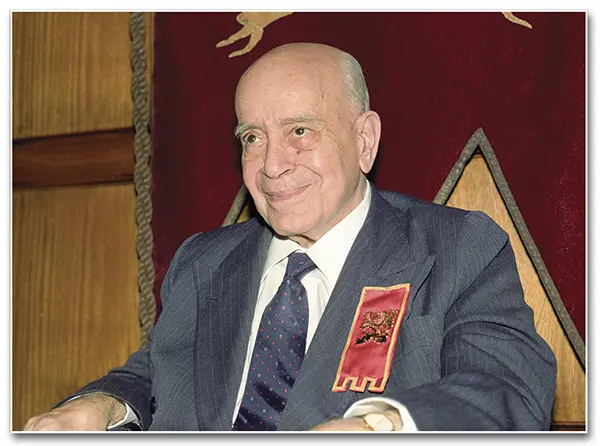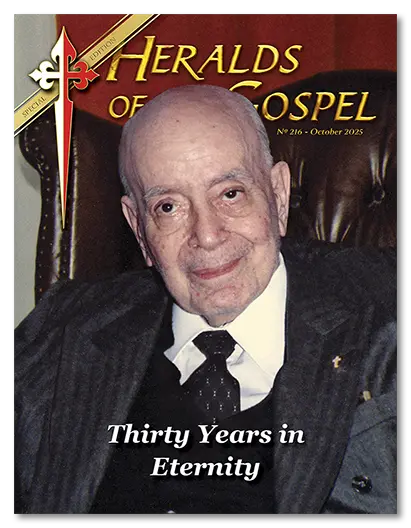Who was Plinio Corrêa de Oliveira? One possible – though incomplete – answer would be to simply recall some of the achievements of his life: he was an undisputed Catholic leader, prolific writer, founder of an apostolic work whose influence knew no boundaries… And the list of his attributes could undoubtedly be much longer, as the pages of this edition suggest.
The mission of a providential man, however, is not circumscribed to his earthly journey. Rather than asking who Dr. Plinio was, we need instead to ask who Dr. Plinio is – and will continue to be. In fact, he himself once declared that his work is “not a museum, but a standard on the march.”1
This perpetuity, which bursts the fetters of death, is especially evident in relation to founders because, as this title itself denotes, all the growth potential of the edifice of their work is contained in the solidity of the foundation, which is they themselves, and the unfolding of the influence of that work will always refer back to its principle, the source of its strength.
Therefore, the relevance of Dr. Plinio’s figure will become evident to the extent that his legacy is put into action, or realized.
It did not remain hidden in the cellars of history, nor in the fading pages of mouldy books; it was placed on a lampstand and written in the souls of countless disciples. And therein lies its advantage. As St. Thomas Aquinas commented,2 the perfection of a being is all the more manifest when he is able to transmit to others what he himself knows how to do. Thus, it cannot be immediately known who Dr. Plinio is without considering the role of his best interpreter: Msgr. João Scognamiglio Clá Dias, founder of the Heralds of the Gospel.

As was the case between Blessed Jordan of Saxony and St. Dominic or, in another context, between St. Michael Rua and St. John Bosco, Msgr. João’s great feat did not consist solely in repeating the achievements of his master, but in taking them further, accomplishing the great aspirations that circumstances had forced him to renounce during his life and which we see today, to a large extent, realized in a work entirely at the service of the Church, as is the Heralds of the Gospel.
The vigour of this sap can be perceived in the seeds that Dr. Plinio planted throughout his life, watering them with much blood, sweat and tears. Its formal cause can be inferred from the will he wrote on January 10, 1978: “I declare that I have lived and hope to die in the Holy Catholic Apostolic and Roman Faith, to which I adhere with every fibre of my soul. I cannot find words sufficient to thank Our Lady for the favour of having lived since my earliest days, and of dying, as I hope, in the Holy Church, to which I have devoted, devote, and hope to devote, until my last breath, absolutely all my love.”3
More than asking who Dr. Plinio was, we need to ask who Dr. Plinio is – and will continue to be. His legacy is not like a museum, but like a standard on the march, placed in the hands of countless disciples
As is clear from the image of the standard on the march mentioned above, Dr. Plinio did not fix himself on a nostalgia for the past, but cast a look of hope to the future. Free from any “archaeologism”, for him the Counter-Revolution lived of longing for the future. And for this reason, confidence is the word that would sum up Msgr. João’s attitude in the face of the events that followed October 3, 1995, the date of his spiritual father’s death.
Confidence because Christ overcame death and this world (cf. Jn 16:33). Confidence because Our Lady in Fatima promised the coming of her Reign. Confidence because providential men, by their contemplation, already participate in the eternity of God4 and therefore do not die: “he who believes in Me, though he die, yet shall he live” (Jn 11:25).
Confidence is born of fidelity to a promise; it is nourished by selflessness in daily struggles, consolidated by a hope that does not disappoint (cf. Rom 5:5) and radiates its effects to posterity. Dr. Plinio lived of hope until his last breath, confirming what he had declared: “After death, I hope to pray before [Our Lady] for all of you, thus helping you more effectively than in my earthly life.”5
Amidst the crises of all kinds that are mounting, the countless examples of confidence given by Dr. Plinio and his perpetual “yes” to the divine plans certainly inspire his spiritual children.6 Grace continues to evoke in their hearts “words of sweetness and of peace,”7 as Fr. Thomas de Saint-Laurent expressed it, and to illuminate the path of those who wish to hear them.
However, just as Dr. Plinio’s triumph was won at the price of much blood,8 so it will also be with his work. As he himself pointed out, the most excellent form of confidence is that which contradicts all prognostications and makes the soul bleed on account of the unexpected, but which bears abundant fruit. In fact, only by following in the footsteps of the Crucified One can the glory of the Resurrection be attained.
The thirtieth anniversary of the death of so distinguished a man takes on special significance in 2025, as we find ourselves in a jubilee year dedicated to hope, the utmost expression of which is the virtue of confidence. In this perspective, Pope Leo XIV comments on true hope, that it consists “not in trying to avoid pain, but in believing that the seed of new life is hidden, even in the heart of the most unjust suffering.”9
Dr. Plinio’s trajectory in the Militant Church was an incessant proclamation of confidence, even when darkness seemed to definitively dominate the light, at the cost of so many injustices and contradictions. But it is on such occasions that it becomes beautiful to believe in the light. If they follow their master in this virtue, his spiritual children – as well as all men of good will – can be champions of confidence, even if events belie their faith. When this occurs, they will believe all the more in the victory and trust “even in the improbable, even in the impossible, if this impossible and improbable are in the paths of Mary Most Holy.”10
Confidence is invincible, for it participates in the victory of God Himself.

Notes
1 CORRÊA DE OLIVEIRA, Plinio. Conversation. Amparo, 17/10/1985.
2 ST. THOMAS AQUINAS. Summa Theologiæ. I, q.108, a.2, ad 2.
3 CORRÊA DE OLIVEIRA, Plinio. 10 de janeiro de 1978: um testamento [January 10, 1978: a Testament]. In: Dr. Plinio. São Paulo. Year III. No. 22 (Jan., 2000), p.5.
4 Cf. ST. THOMAS AQUINAS, op. cit., q.10, a.3, ad 1.
5 CORRÊA DE OLIVEIRA, 10 de janeiro de 1978: um testamento [January 10, 1978: a Testament], op. cit., p.5.
6 See especially the article The Story of a Constant “Yes”, in this issue.
7 SAINT-LAURENT, Thomas. The Book of Confidence. Nobleton: Heralds of the Gospel Canada, 2019, p.13.
8 In this regard, see the article The Triumph Obtained by Blood in this issue.
9 LEO XIV. General Audience, 27/8/2025.
10 CORRÊA DE OLIVEIRA, Plinio. Conference. São Paulo, 20/12/1991.


